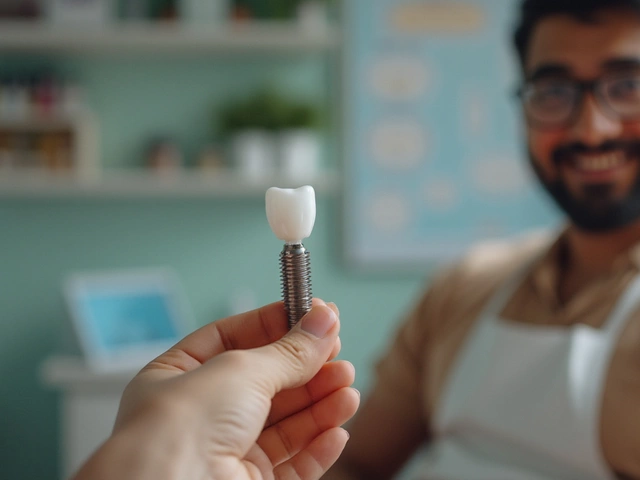- Home
- Dental Health
- Understanding Who Should Avoid Dental Implants

Understanding Who Should Avoid Dental Implants
Dental implants have revolutionized the way we approach missing teeth, offering a reliable and natural-looking solution. However, they aren't the best choice for everyone. Before diving into the process, it's critical to understand the circumstances where dental implants may not be advisable.
Some people may face heightened risks due to various factors, including certain medical conditions, personal habits, and bone health. Let's explore these aspects to better understand who should think twice before opting for dental implants.
- What Are Dental Implants?
- Medical Conditions to Consider
- Lifestyle Factors and Habits
- Age Considerations
- Bone Health and Density
- Consultation and Evaluation
What Are Dental Implants?
Dental implants are a modern marvel in the field of dental health, providing individuals with a robust solution for missing teeth. They act as artificial tooth roots, typically crafted from titanium, and are surgically positioned into the jawbone beneath the gums. Over time, these implants fuse with the bone through a process known as osseointegration, which anchors them firmly and allows them to support artificial teeth, commonly referred to as crowns.
For many, the allure of dental implants lies in their ability to mimic natural tooth structure, function, and appearance so closely. This aspect makes them particularly appealing to those who seek seamless integration with their natural oral aesthetics. Unlike dentures, which may shift and require adhesives, implants remain fixed in place, offering the confidence to eat, talk, and laugh without worry.
The invention of dental implants dates back to the early 20th century, but it wasn't until advances in the 1950s that they became more viable, thanks to Swedish orthopedic surgeon Per-Ingvar Brånemark. His pioneering research laid the groundwork for utilizing titanium, thus revolutionizing oral care as we know it today.
The Process of Getting Dental Implants
The process of obtaining dental implants involves multiple stages, each crucial for ensuring the implant's success. Initially, a thorough examination and consultation with a dental professional help determine one's candidacy. This involves X-rays or 3D imaging to assess bone density and overall dental health. Once deemed suitable, the surgical procedure follows. The surgery itself is usually performed under local anesthesia, although sedation options are available for those who prefer it.
"Dental implants hold the promise of a more stable alternative to bridges and removable dentures," noted the British Dental Association, highlighting the significant impact implants have had on oral care.
Components and Variations
A complete dental implant system consists of several components, each serving a distinct purpose. The implant itself is the titanium post that gets embedded into the jawbone. Above this is the abutment, a connecting piece that secures the artificial tooth or crown to the implant. The crown is custom-made to blend seamlessly with the surrounding teeth.
While most implants are made of titanium, there are alternatives such as zirconia, which are more aesthetically pleasing for some patients due to their tooth-like color. Different types of implants cater to varied needs, including endosteal implants, which are the most common, subperiosteal implants, and the relatively newer mini implants, suitable for those with less bone density.
Medical Conditions to Consider
When contemplating dental implants, it’s crucial to assess any underlying medical conditions that might affect the procedure's success or safety. Certain diseases and health concerns can complicate both the placement of implants and the healing process afterward. Among these, diabetes and heart disease are notable. Uncontrolled diabetes, for instance, can impede the body’s ability to heal, which is essential after any surgical procedure like implants. A stable blood sugar level is vital to avoid complications and support a good outcome. Similarly, heart disease can pose risks during surgical procedures. Patients with significant heart conditions should consult with both their cardiologist and dentist to ensure it’s safe to proceed.
Another essential consideration is osteoporosis, a condition characterized by weakened bones. Since dental implants need to integrate with the jawbone, the quality of the bone is critical. People with osteoporosis might experience reduced bone density, posing a challenge for implant stability. Medications used to treat this condition, such as bisphosphonates, can also affect bone healing, making it imperative for individuals to have thorough discussions with their healthcare providers before any dental surgery.
Certain autoimmune diseases, such as rheumatoid arthritis or lupus, can also impact the decision to undergo dental implants. These conditions may affect the body’s immune response, altering healing or causing complications. Moreover, treatments for these diseases, such as medications that suppress the immune system, can further complicate the body's capacity to recover post-implantation. A comprehensive evaluation by both a dentist and a medical specialist is recommended in these scenarios.
"Research suggests a cautious approach to dental implants in patients with autoimmune diseases, necessitating personalized care strategies," advises Dr. Angela Phillips, a well-regarded expert in dental surgery.
Serious gum disease, or periodontitis, is another condition to keep in view. Healthy gums are necessary to support the implant, and existing gum disease could lead to implant failure. Before considering implants, individuals must work to restore gum health through professional treatment and improved dental health practices. Lastly, cancer patients undergoing treatments like chemotherapy or radiation should fully understand the potential challenges dental implants may pose. These treatments can weaken the immune system and affect healing, so timing and coordination of implant procedures are key.
Ultimately, a thorough assessment of these medical conditions and individual health assessments are essential steps. By discussing these issues with both dental professionals and medical doctors, individuals can make informed decisions, steering clear of potential complications and ensuring the best possible outcomes in their oral care journey.

Lifestyle Factors and Habits
When considering dental implants, our day-to-day lifestyle choices play a surprisingly pivotal role in determining eligibility. One of the most significant factors is smoking. Smokers often face an increased risk of implant failure due to poor blood flow in the gums. Nicotine can constrict blood vessels, reducing the necessary oxygen flow and impairing healing processes. Quitting smoking not only boosts oral health but greatly increases the success rate of implants. In fact, some dentists insist that patients quit smoking before and after the procedure to ensure the best outcomes.
Alcohol consumption also deserves scrutiny. Excessive drinking can complicate the recovery process by impairing both the immune system and liver function, both of which are crucial for healing. This, coupled with dehydration that often accompanies heavy drinking, creates a less-than-ideal environment for an implant to successfully integrate with the bone. Patients are often advised to keep alcohol use moderate and primarily before undergoing the procedure, to optimize recovery and minimize risks.
Diet cannot be overlooked either. A poor diet lacking in essential vitamins and minerals can affect bone density and overall oral health. Calcium and Vitamin D are vital for healthy bones and healing tissues. Without proper nutrition, patients may experience delayed recovery times or complications post-surgery. A balanced diet rich in fruits, vegetables, lean protein, and dairy provides the necessary nutrients for success.
Commitment to oral hygiene is equally crucial. While it may seem obvious, ensuring proper care of the mouth is directly linked to the success rate of dental implants. Regular brushing, flossing, and dental check-ups must become a part of your routine. Neglecting oral hygiene leads to gum disease, which can jeopardize the stability of an implant. Regular cleaning prevents infections and keeps the implant site healthy.
Stress management might seem a surprising element in this list, but stress has a direct impact on oral health. It can cause clenching or grinding of teeth (bruxism), which puts excessive pressure on implants. Moreover, stress can dampen the immune system’s efficacy, crucial for healing. Patients should consider stress-relief practices such as yoga, meditation, or exercise, which promote overall well-being.
Lastly, sports enthusiasts or individuals with habits prone to facial trauma must be cautious. Contact sports or even aggressive recreational activities pose risks to dental health. If avoiding these isn't feasible, then using protective gear like mouthguards is vital. Dental health shouldn't sideline your passion, but it necessitates mindful protection.
"Lifestyle modifications are often overlooked, yet they can significantly impact the integration success of implants," says Dr. Susan Richardson, a renowned oral surgeon.
In conclusion, aligning your lifestyle with these pointers not only prepares you for dental implants but ensures that they stand the test of time. It's about creating a nurturing environment for your new implant to thrive in.
Age Considerations
When it comes to dental implants, age plays a significant role in determining suitability. One might assume that only older adults are candidates for implants due to tooth loss being more common with age. However, age is not merely a number when it comes to this dental procedure. Both very young individuals and the elderly may face unique challenges that need to be carefully evaluated by dental professionals.
For teenagers and children, placing dental implants is usually recommended only when facial growth and jawbone development are complete. This typically occurs around the ages of 18-21. If implants are placed before the jaw is fully developed, it may result in misalignment as the jaw changes size and shape. It's crucial for young individuals to undergo thorough growth assessments before considering implants.
"It is important for the developing jaw to reach maturity to ensure the implant remains correctly aligned as the person grows," explains Dr. Jane Davies, a renowned dental surgeon.
On the opposite end of the spectrum, older adults often have to contend with different challenges. Age-related bone loss can significantly impact the success of dental implants. Bone density decreases naturally with age, and this can affect how well an implant integrates with the jawbone. Despite these challenges, many older patients have successfully received implants with appropriate bone grafting and preparatory procedures.
Advancements in dental technology and techniques mean that age alone is not a prohibitive factor for implants. In many cases, older adults enjoy the benefits of improved oral function and aesthetics that implants provide. However, comprehensive evaluations are necessary to ensure no underlying health conditions that could complicate surgery. It's a balance of assessing the risks against the benefits, and often, a collaborative approach between the dentist and the patient leads to satisfactory outcomes.
Also, lifestyle and oral health maintenance are key considerations at any age. Regardless of being young or old, good oral hygiene practices should precede and follow the implant procedure. Proper care helps in preventing infections and ensuring the longevity of the dental implant. The decision to get dental implants should involve careful deliberation and discussion with dental experts, considering both current health and future needs.

Bone Health and Density
Bone health plays a pivotal role when considering dental implants. A strong jawbone is essential to successfully anchor a dental implant. Without ample bone density, the implant may not properly integrate, leading to failure. This integration, known as osseointegration, is crucial as it connects the implant to the jawbone, simulating the natural tooth root. If the bone health is compromised, achieving this connection becomes challenging, if not impossible.
One interesting statistic is that approximately 40% of patients seeking dental implants are found to have inadequate bone density during their initial assessment. This can be due to a variety of factors, such as long-term tooth loss, periodontal diseases, or conditions like osteoporosis. Osteoporosis, in particular, reduces bone density throughout the body, including the jaw, thus posing significant risks for implant failure. A study published in the "Journal of Oral Implantology" found that individuals with osteoporosis were three times more likely to face complications with dental implants.
"A thorough evaluation of a patient’s bone health is crucial to the success of dental implants," notes Dr. John Henderson, a prominent oral surgeon. "We must ensure the jawbone has the strength to support the structure effectively.”For those with compromised jawbone density, dentists might suggest bone grafting as a precursor to implants. Bone grafting involves augmenting the bone in the jaw to create a solid foundation for the implant. It's a well-established method, though not everyone is a suitable candidate. Factors like blood circulation in the jaw and the patient’s overall health must be considered before proceeding with this additional procedure.
If you're considering dental implants, your dentist will likely evaluate your bone health using advanced imaging techniques like CT scans. These imaging tests offer a clearer picture of your jawbone’s structure, aiding the dentist in planning whether a bone graft is necessary. Patients often wonder if age impacts bone density and, by extension, implant candidacy. While age can influence bone health, it's not the sole factor. Many elderly patients with good bone density can undergo implants successfully. Conversely, younger patients with bone health issues may face challenges. It's all about the current state of the jawbone, rather than the patient’s age ratio.
Having implants isn't just about filling the gap left by a missing tooth. It’s about ensuring those replacements function like natural teeth and last a lifetime. Neglecting bone health can lead to complications in the long term, underscoring the importance of a thorough evaluation and potentially supplemental procedures like bone grafts or sinus lifts. As with most medical procedures, a personalized approach is key; understanding that every patient's bone health is unique is the first step toward successful dental implants.
Consultation and Evaluation
The journey towards getting dental implants begins with a crucial step: the initial consultation. A thorough evaluation by a dental professional is essential to determine if someone is a suitable candidate. In this stage, both the patient's overall health and specific oral conditions are meticulously assessed. Dental professionals often take a comprehensive medical history to identify any underlying health issues such as diabetes or gum diseases, which might complicate the implant process. They check for any signs of ongoing infections or untreated tooth decay, ensuring a healthy environment for the implants.
Evaluating bone health is a pivotal part of this consultation. Many might not realize, but bone density plays a significant role in the success of implants. Dental screener will likely perform X-rays and advanced imaging techniques to ascertain the bone structure and quality. A lack of sufficient bone can either disqualify someone temporarily or require a bone grafting procedure prior to implant placement. Without healthy bone, the implant won’t have the necessary support to function correctly. During this stage, it's also essential to discuss lifestyle habits, like smoking or alcohol consumption, which can impede the healing process.
"Dental implants require a solid foundation," notes Dr. Margaret Young, a prominent dental surgeon based in New York. "Adequate bone density and healthy gums are crucial for ensuring the longevity of the implant."
After the physical evaluation, the dental professional often discusses the process in detail, covering possible risks and expected outcomes. Transparency is key here – understanding that the procedure, like any surgery, carries inherent risks can help set realistic expectations. They also talk through the importance of post-surgery care and ongoing oral health maintenance, emphasizing that implants are not a 'set and forget' solution but need consistent care.
It's not uncommon for the consultation to involve some diagnostic procedures. Blood tests might be necessary to analyze certain conditions that affect healing. This preparation helps the dental team catch potential red flags early, increasing the chances of a successful outcome. Throughout the evaluation, patient questions should be encouraged and addressed thoroughly to ensure a clear comprehension of both the process and the commitment required. This consultation phase is not just informative but also empowering, allowing individuals to make informed decisions based on an understanding of their personal health circumstances and oral care needs.

Arnav Singh
I am a health expert with a focus on medicine-related topics in India. My work involves researching and writing articles that aim to inform and educate readers about health and wellness practices. I enjoy exploring the intersections of traditional and modern medicine and how they impact healthcare in the Indian context. Writing for various health magazines and platforms allows me to share my insights with a wider audience.
About
Medical Resource Center India is a comprehensive online platform dedicated to providing reliable health information and medical resources in India. Explore a wide range of articles, tips, and advice on medicine, healthcare services, and wellness. Stay informed about the latest developments in Indian medicine and access valuable insights into maintaining a healthy lifestyle. Discover expert guidance and health solutions tailored for every Indian citizen. Your go-to destination for authoritative medical knowledge in India.








